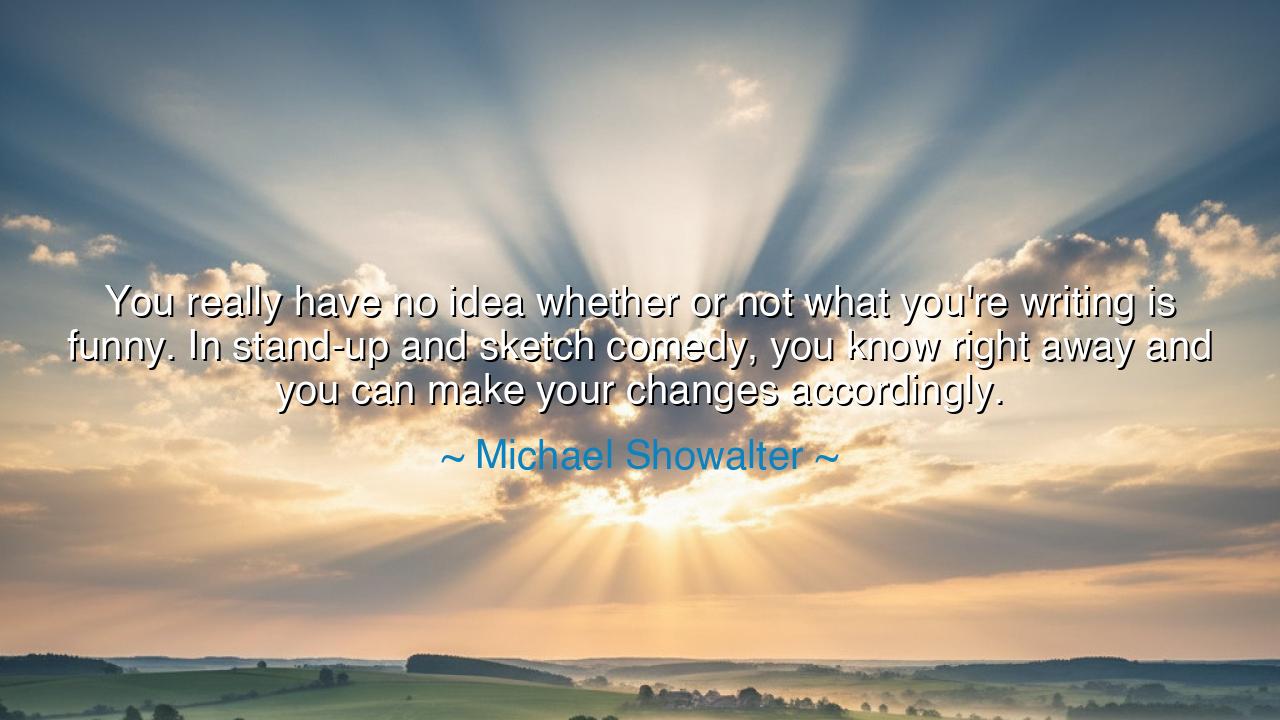
You really have no idea whether or not what you're writing is
You really have no idea whether or not what you're writing is funny. In stand-up and sketch comedy, you know right away and you can make your changes accordingly.






In the wise reflection of Michael Showalter, who said, “You really have no idea whether or not what you’re writing is funny. In stand-up and sketch comedy, you know right away and you can make your changes accordingly,” there lies a timeless truth about the nature of creation, uncertainty, and courage. His words speak not merely of comedy, but of the deeper struggle faced by all who labor in the unseen — the poet, the thinker, the inventor, and the dreamer. For to create in solitude is to send one’s heart into the unknown, never knowing whether it shall return crowned with laughter or shrouded in silence.
In writing, one crafts in darkness. There is no audience, no instant echo to affirm the worth of a thought. Each sentence is a flame kindled in the night, and the writer must trust that it will one day light another’s soul. But in stand-up or sketch, the creator stands before the living — and their laughter or stillness becomes the mirror of truth. The wisdom in Showalter’s saying is not only about art; it is about the rhythm of feedback and the courage to walk without it. To write is to plant seeds in unseen soil. To perform is to harvest immediately. Both are sacred paths, and both demand faith — faith that one’s voice will find its way through the silence.
So it has been since the days of the ancients. Consider Socrates, who spoke beneath the open sky, his words answered by the laughter and anger of men. He was a comedian of truth, performing his philosophy before the crowd, adjusting his questions as he watched their faces change. But Plato, his student, chose the quiet road of writing. His words had no immediate witness, no crowd to test their power. Yet across centuries, they echo still. The master sowed in real time; the student sowed for eternity. Thus, in Showalter’s contrast between writing and stand-up lies this eternal dichotomy — the fire of the present and the patience of the future.
To those who write — who build, who invent, who dream unseen — this truth brings both burden and blessing. You may not know whether your work is “funny,” or true, or worthy. But in that unknowing lies the nobility of your labor. For it is easy to act when the applause is immediate; it is harder, and holier, to act when the world is silent. The artist of faith works not for laughter, nor for approval, but for the inner conviction that what they create holds meaning — even if that meaning blooms long after they are gone.
Think too of Vincent van Gogh, who painted with ferocious devotion, never hearing the world’s applause. His life was filled with silence, his art unappreciated in its time. Yet his colors became the laughter of eternity — their light echoing long after his voice was gone. Van Gogh could not “make changes accordingly,” for no crowd cheered before his canvas. He, like the writer, walked the lonely path of the unseen creator. But in doing so, he revealed the deepest courage of all — the courage to believe in beauty before it is witnessed.
And so, Michael Showalter’s words become more than the musings of a comedian; they become the whisper of a sage. They remind us that creation requires two spirits: one that acts boldly in the presence of others, and one that waits patiently in the absence of affirmation. Both are paths to truth. The laughter of the crowd may guide you swiftly, but the silence of solitude may shape you deeply. Do not fear either — for both refine the soul that seeks mastery.
Therefore, let this teaching guide your own hands: if you create, create with trust. When you write, and no one laughs — keep writing. When you speak, and no one answers — keep speaking. When the world gives you silence, become your own audience. In time, what is true will find its resonance. For whether in the sudden joy of laughter or the slow unfolding of time, all genuine creation returns to its maker with a message: that every act of honest expression, though uncertain, is never in vain.
Thus, work not for the sound of laughter, but for the soundness of the heart that gives it. And when doubt comes — as it always shall — remember this: even the writer who cannot hear the laughter still shapes the world where it will someday rise.






AAdministratorAdministrator
Welcome, honored guests. Please leave a comment, we will respond soon